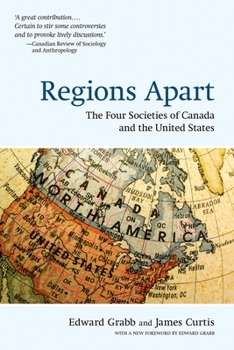Regions Apart: The Four Societies of Canada and the United States (Wynford)
Regions Apart provides an invaluable social, cultural, and political comparison of the two countries that share the world's longest undefended border--Canada and the United States. General readers and students alike will find this book an insightful analysis of how and why Americans and Canadians differ, not only from each other but from region to region within each country. Recognizing the inevitability of the comparison, the authors explore...
Format:Paperback
Language:English
ISBN:0195438302
ISBN13:9780195438307
Release Date:June 2010
Publisher:Oxford University Press Canada
Length:344 Pages
Weight:0.80 lbs.
Dimensions:0.6" x 6.4" x 9.0"
Related Subjects
Americas Biological Sciences Biology & Life Sciences Botany Canada Comparative Politics Education & Reference History Humanities Political Science Politics & Government Politics & Social Sciences Science Science & Math Science & Scientists Science & Technology Social Science Social SciencesCustomer Reviews
1 rating
Read this, not "Fire and Ice"
Published by Thriftbooks.com User , 19 years ago
Right now it seems the most popular book among Canada's intellectual elites is "Fire and Ice" by Michael Adams. Adams basically used a lot of flawed and twisted poll data to manufacture a "statistical conclusion" that the United States is some sort of evil backwards right-wing fundamentalist kook hole, while Canada is an unbridled utopia of liberalism and egalitarianism. It's unfortunate that Adams' polemic, partisan pseudo-study gets so much attention and "Regions Apart," a much better book, will no doubt go largely ignored. "Fire and Ice" was popular because for the large part it preached to the choir. Many Canadian "nationalists" desperately want to believe that there are huge, insurmountable differences between the US and Canada, and Adams, with his clever and often dishonest statistical calculations created data that seemed to prove just that. The authors of "Regions Apart" have a different argument, however. Through a calm, careful, and (most importantly), completely transparent analysis of recent polling data from the US and Canada, Edward Grabb and James Curtis argue that many of Canada's most cherished myths are in fact not true. Looking at North American history and historiography, the two authors attempt to explore the roots of the modern-day myths of "liberal, collectivist Canada" and "conservative, individualistic America." They then look at polling data to see if such myths have a basis in contemporary reality. In the end their findings may upset many Canadian nationalists, or even conservative American Canada-bashers. The two professors demonstrate that Canada and the US are more alike than different. The US, for example has a much lower church attendance rate than its "religious" reputation would suggest, and most Canadians profess support for lower taxes and individualism, in a far cry from their supposedly inherently "collectivist/socialist" character. Most notable of all however is their argument that North America is not really two nations, but rather four: English Canada, the Northern US, Quebec, and the Southern US. The authors show that the Northern US and English Canada are largely identical in terms of values and beliefs. It's only when you look at the super-left wing views of Quebec and the far-right views of the US South that noticable deviations become apparent. Despite what Canadian lefties like Michael Adams will allege, Canada and the United States ARE getting more and more alike. The Southern US still tends to push American politics to the right overall, and Quebec still pushes Canada to the left, but even these two regions are generally getting more moderate and centrist as the years progress. The book for the most part is well-written and easy to follow. At times it gets a bit academic, but overall it is an enjoyable and engaging read. This is a very important book that all Canadians should read, ESPECIALLY those who have already been subjected to the works of Michael Adams.





